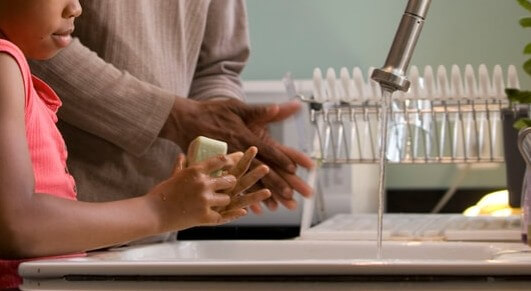Many parents are currently juggling work, parenting, and now homeschooling as well. Some parents are essential workers who put themselves at risk, and in turn, their children. Others have to manage getting work done while sheltering in place with restless youth. On top of this, many are facing financial struggles while worrying about the health of loved ones. In such a stressful time, it can be difficult to maintain a calm demeanor. The anxiety can get overwhelming. As you navigate parenting through this pandemic, it is important to be aware of the fact that our children look to us for emotional cues. By managing our own anxiety, we can empower ourselves and our children.
COVID-19 Anxiety is Contagious

In addition to the natural physiological response that causes your children to follow your lead, children consciously look for cues from you. As their parent and primary caregiver, you are the most trusted person in your child’s life. They will be looking to you to gauge the severity of situations and to decide how to react. They are very observative and can pick up on changes in your facial expressions, tone of voice, posture, and body language.
Impact of Shared Anxiety during the COVID-19 Pandemic:
Increased worries
When children see you worry it suggests that there is something to be worried about, and therefore they worry. They try to understand the problem and come up with their own solutions. As we know, sometimes the solutions they come up with aren’t the best.
Decreased confidence
When we worry too much and too openly about our kids it undermines their confidence in themselves. For example, you may worry that your kids are not practicing proper hand-washing and other safety measures. You start to talk to them about it nonstop. Your child picks up something from the grocery bags you just brought in and you panic. Your children see and hear you worrying. They may also begin to question if they are capable of keeping themselves safe. This decreases their sense of self-reliance and may even increase anxiety. Excessive worry communicates that we don’t think they can handle the situation and this undermines their ability to actually handle the situation.
Diminished confidence in you as a parent
Observing you manage your anxiety and worry can provide children with the skills and stamina to tackle their own anxiety. However, watching your worry spiral and consume you suggests that the anxiety is stronger than you, the parent. This situation is scary for children (and teens) because you’re the one who is supposed to be able to handle everything. You’re the one they rely on to solve problems and keep them safe. If you can’t handle what’s happening, this leaves your child feeling vulnerable.
Reduced sense of safety
Anxiety and worry typically hang out with fear. When children are experiencing your anxiety, they feel nervous, they actively worry, and their body experiences the sensations of fear. These sensations can include increased heart rate, physical pains, restlessness, and an upset stomach. Children often don’t know where to attribute those sensations. They start to feel unsafe and associate those feelings with any related situation. They can become fearful of bedtime, or going to school, or playdates, or visiting relatives, or eating or any number of other situations.
How to Manage Anxiety during the COVID 19 Pandemic:
Consider your reactions around your children
Consider your verbal and nonverbal communication to and in front of your child. They don’t need to know the latest report on coronavirus cases, and they don’t need to know how worried you are about it. Furthermore, be intentional about how you respond when your worry is triggered. What is your facial response? Is your voice calm? Does your demeanor change? Despite your anxiety, it is important to appear to be in control of your emotions. Instead of being panicked by something they touch, be firm and grounded about what they should and should not touch.
Own your emotions
There are times when your children are going to see that you are worried. Own that the anxiety is yours and if appropriate, in an age appropriate way, explain why you are worried and what you are going to do to make it better or manage that feeling. Also, let them know that just because you are feeling nervous doesn’t mean that they have to feel nervous, but it’s ok if they do.
Anxiety and Control
Anxiety often occurs when we feel a lack of control over our lives. It is not at all surprising that a global pandemic would make many of us feel powerless and worried. However, it is important to focus on the things that you can control, such as following CDC recommendations and making the most of your time at home. Just as importantly, try to let go of the things you cannot control, such as how long the lockdown will last.
Be strength-based
You should be empowering your child during this time to focus on themselves and the strengths that they have. Continue to emphasize the importance of schoolwork, exercise, and artistic expression; and be sure to acknowledge their successes in these areas. Notice appropriate social distancing and proper hand-washing.
Engage your support system
Call your friend who will let you know if you are going off the deep end or if your worries are warranted. Vent, complain, and cry but be sure to do it out of your child’s ear shot.
Get Help
If you find yourself overwhelmed with coronavirus anxiety, often unable to hide it from your child, it may be time to seek additional help. Many psychotherapists are currently offering online sessions and are only a google search away.
Being in control of your own anxiety is not only empowering for yourself, but will help your children as well. By learning how to cope with your anxiety, you’re setting a great example for your kids.
Interested in Online Therapy?
Contact us for a free video consultation.
(908) 242-3634 or Connect Now



11 thoughts on “Health Anxiety is Contagious: How to Help Your Child Feel Safe During COVID-19”
Comments are closed.